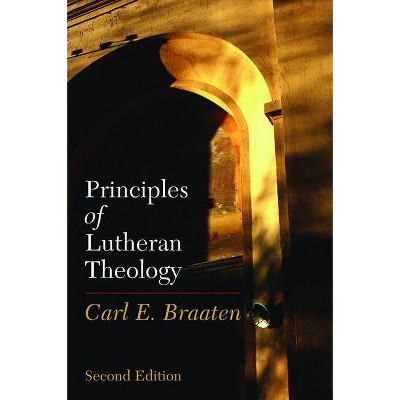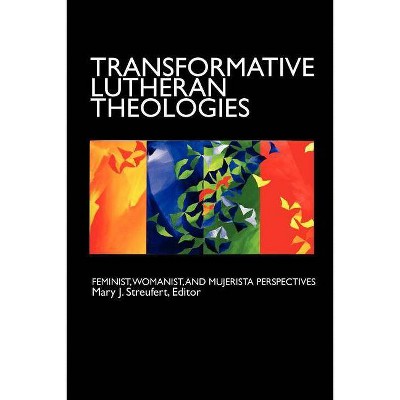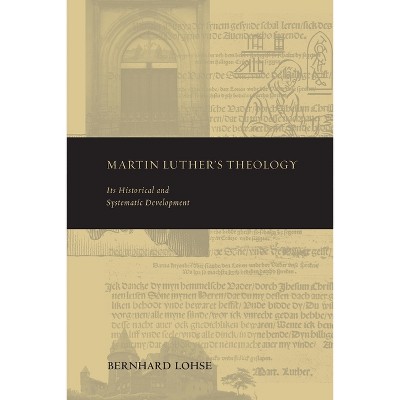About this item
Highlights
- Weber demonstrates conclusively that despite historical critiques of quietism, European Lutherans developed a social ethics in the centuries following the Reformation that brought about fundamental systemic and structural changes in social services, law, education, health care, the formation of states and nations, and public morality.
- Author(s): Leslie F Weber
- 757 Pages
- Religion + Beliefs, Christianity
Description
About the Book
Despite critiques of quietism, European Lutherans fostered social ethics that produced systemic, structural changes in social services, law, education, health care, states and nations, and public morality and eventually led to the welfare state. Grounded in faith active in love for the neighbor, Lutherans transformed northern Europe.Book Synopsis
Weber demonstrates conclusively that despite historical critiques of quietism, European Lutherans developed a social ethics in the centuries following the Reformation that brought about fundamental systemic and structural changes in social services, law, education, health care, the formation of states and nations, and public morality. Those changes eventually led to the development of the welfare state. In so doing, Weber challenges interpretations by scholars, such as the German Lutheran theologian Ernst Troeltsch, who argued that Lutheran theology created a church operating at a remove from society's pressing questions.
Weber's comprehensive coverage of northern European society from the Reformation era through the nineteenth century utilizes the tools of sociology, theology, history, and ethics to demonstrate that Lutheran ethical theory, a Lutheran understanding of the social order, and Lutheran social reforms lie at the heart of modern European social institutions. Grounded in a Lutheran ethic of faith active in love for the neighbor, Lutheran ethics transformed the household and polity, developed government care for the poor, protected public health, and promoted social welfare within a new moral and legal order that continues to underpin contemporary social democracy across northern Europe.
Review Quotes
Grounded in a magisterial tracing of Lutheran history and theology, this work by Leslie Weber insists that we look at the very non-quietist way Lutheran social ethics were embodied in institutions of public welfare in Germany and Scandinavia. With the insight of a sociologist and the heart of a pastor, Weber shows us what that history can tell us about how people of faith in the US today can mobilize for the good of the world. --Nancy Ammerman, professor emerita, sociology of religion, Boston University
In this informative and expansive study, Leslie F. Weber Jr. provides a sweeping overview, ranging from the sixteenth to the twenty-first century, of the diverse contributions the Lutheran heritage made to the articulation of theologically informed social-reform theories, the formulation of public policies, the establishment of social-welfare institutions, and the implementation of ecclesiastical and governmental programs that addressed specific societal needs. Weber explores the extensive scholarly literature with care and offers corrections and nuances when necessary. Theological, historical, and sociological insights inform the story he recounts and the interpretative insights he offers. The volume serves as an informed corrective to the critique that Lutherans have manifested an inclination toward social quietism and provides extensive evidence of the significant and persistent contributions of Lutheranism to the quest for the common good and the emergence of social democracy in the European countries where this Christian tradition was a formative one. --Kurt K. Hendel, Bernard, Fischer, Westberg Distinguished Ministry Professor Emeritus of Reformation History, Lutheran School of Theology at Chicago
Weber demonstrates how Luther's fierce critiques of bankers, courtiers, and any others who exploited the less fortunate, along with his advocacy of the community's care for the ill and the poor, have found echoes throughout five centuries of Lutheran proclamation and practice. Weber's careful historical review and his engagement with interpretations that obscure Luther's broad understanding of love for the neighbor construct a firm basis for his argument for continuing the Lutheran call to reject the individualism and materialism of Western societies today and to put loving neighbors as we love ourselves into concrete practice. --Robert Kolb, professor of systematic theology emeritus, Concordia Seminary
Leslie F. Weber presents four centuries of Lutheran social engagement in Northern Europe with impressive historical detail, careful sociological analysis, and theological insight. He offers new perspectives both on central Lutheran teaching and on Lutherans' action in changing social and political circumstances. As he sets out to do, he effectively rebuts charges of Lutheran quietism. --L. DeAne Lagerquist, professor emerita of religion, Harold J. Ditmanson Chair, St. Olaf College
In this definitive study, Leslie F. Weber Jr. combines insightful historical research with a career devoted to the church's social teaching to demonstrate the penetration of Reformation teaching into the fabric of German and Scandinavian societies. Refuting the thesis of Troeltsch about Lutheran quietism, this book documents the manifold ways Reformation theology--especially Luther's Two Governances (kingdoms)--gave rise to responsibility for the common good. Across the centuries, the teachings and practices of the Reformers generated impetus for charity and social justice, leading eventually to welfare states that function best as democracies, where citizens are free to participate in the spirit of a universal priesthood. --Craig L. Nessan, William D. Streng Professor for the Education and Renewal of the Church, and professor of contextual theology and ethics, Wartburg Theological Seminary
Shipping details
Return details
Trending Book Pre-Orders












